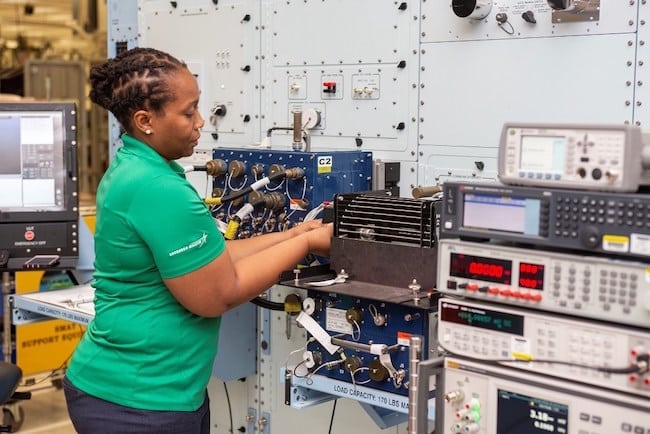
Lockheed Martin technicians build and test eCASS stations, which troubleshoot and repair avionics for Navy aircraft, at a facility in Orlando, Florida. (Michelle Jeffries, Lockheed Martin)
The U.S. Navy’s F-35C Lightning II Joint Strike Fighter (JSF) aircraft carrier variant will use Lockheed Martin’s electronic Consolidated Automated Support Systems (eCASS) for avionics testing when it starts entering into service. The Navy hopes to achieve initial operational capability (IOC) for the F-35C next year.
Under a seven-year contract worth up to $500 million, Lockheed will manufacture 211 total eCASS systems. The technology provides troubleshooting and repair support for avionics on aircraft operated by the Navy and other military aviation divisions.
“The F-35C is planned to be tested with eCASS as the platform enters the fleet. The eCASS modular design with planned expansion capabilities in software, station power and for new instruments support the goal of accommodating emerging requirements of future weapons systems,” said Melville.
This is the first new CASS contract issued by the Navy since the year 2000, according to Lockheed. It will provide significant modernization for the test equipment being used by the Naval Air Systems Command (NAVAIR), as the legacy CASS equipment currently being used is based on 1980s technology, says Ed Melville, automated test system portfolio manager at Lockheed Martin.
eCASS also provides testing support for avionics on F/A-18E/F, E-2 C/D, AH-1, CH-53, MQ-53, P-8, MH-60R and AV-8B. The equipment is compatible with the integration of new testing capabilities such as PXI Express (PXIe) and synthetic instrumentation.
“CASS is based on a VME Buss using primarily custom made instruments (for stimulation and measurement) controlled by a station controller operating with VMS, X-Windows and programmed in FORTRAN. In contrast, eCASS is based on more current technologies, modular in design, operating in a Windows 10 environment and uses primarily COTS (Commercial Off The Shelf) Instruments and computers programmed with C++ and C# (C Sharp),” Melville told Avionics.
The new contract will be handled by the rotary mission and systems division of Lockheed. The aerospace and defense OEM will start manufacturing the new stations in August 2019 for the new contract.